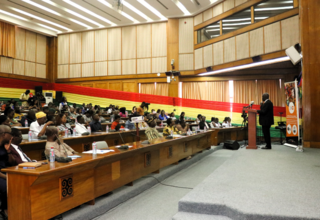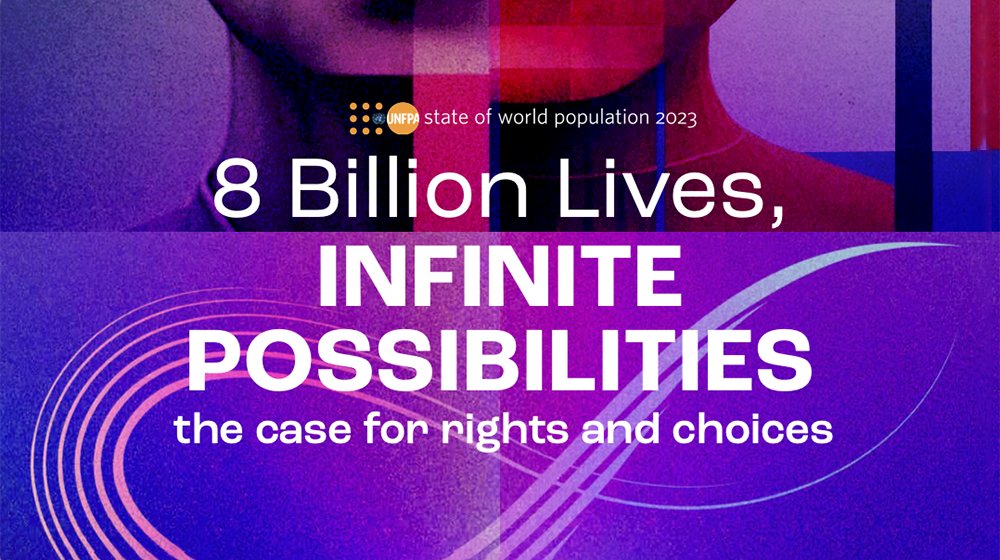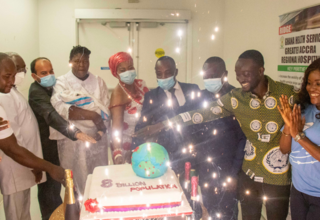Notable Chairperson, Dr. Gloria Quansah Asare, Deputy DG- GHS
Her Excellency First Lady of Ghana Mrs. Lordina Mahama,
Honourable Minister of Health, Mr. Alex Segbefia
Honourable Central Regional Minister, Hon. Kweku Ricketts Hagan
Colleagues from ICM,
Members of the Midwifery Profession,
Distinguished Invited Guests, Friends from the Media, Ladies and Gentlemen:
I bring you warm greetings from the Executive Director of UNFPA, Babatunde Osotimehin whose message forms part of my speech. On this International Day of the Midwife, UNFPA, the United Nations Population Fund, salutes the contribution of midwives to saving the lives of women, adolescent girls and newborns, sometimes under very difficult circumstances, in hard-to-reach communities, in humanitarian emergencies, and in fragile and conflict-torn zones.
Honourable Ministers,
Well-trained and supported midwives working in communities are uniquely positioned to provide the compassionate, respectful and culturally sensitive care a woman needs during pregnancy and childbirth. Midwifery is equally important for newborns during the critical first month of life, and is a significant contribution to sexual and reproductive health in general.
Midwives are, therefore, essential to achieving the Sustainable Development Goals. Some quick evidence will show why this is the case. The world has almost halved maternal deaths since 1990, but every year, some 300,000 women still die during pregnancy and childbirth, and almost 3 million babies do not survive their first four weeks of life. A vast majority of these largely preventable deaths take place in developing and crisis-affected countries.
In the past 25 years, Ghana made significant progress in reducing maternal deaths through considerable investment in healthcare. Skilled delivery improved from 59% (2008) to 74% (2014). However, although the country’s maternal mortality ratio decreased from 760 to 319 /100,000 live births between 1990 and 2015, we missed achieving the MDG target of 190/100,000. There is thus a need to scale up and strengthen our efforts.
In 2015, the available total midwifery workforce in the country was 5,711 but there were 1,268 graduated staff, who were yet to be posted. If by 2030, the size of the midwifery workforce expands to equivalent of 13000 full-time midwifery service providers, Ghana could potentially have an estimated 80% of its population’s midwifery needs met. For this scenario to apply, Ghana requires further increases in both training and employment of midwives. If the total workforce is deployed geographically according to relative needs, these trained midwives would help reduce by approximately two thirds the current maternal mortality ratio. Significant investments in midwifery are therefore essential if Ghana is to achieve its dream of reducing maternal and newborn deaths to the barest minimum by 2030.
Distinguished Chairperson,
The right to health is a basic human right that every woman should enjoy. Yet every day almost 1000 women die in pregnancy and childbirth globally. Eight million women suffer pregnancy related disabilities such as obstetric fistula on yearly basis and two million babies do not survive beyond twentyfour hours. It is estimated that, between 711 and 1352 women develop fistula every year in Ghana. One of the main causes for these tragedies is the lack of access to quality maternal health services including the care of midwives.
Her Excellency,
UNFPA has for the past five years stressed the fact that no amount of investment will yield any fruits if the very people – the skilled attendants, who are the midwives on account of whose welfare and work, we are all gathered here to celebrate, have a divided front. Today, I am happy to say that for the first time, the Ministry of Health managed to get the two midwifery associations to sit at the same table to plan the 2016 International Day of the Midwife celebrations. This is a step in the right direction. I would urge the Ministry to ensure it is not only sustained, but built upon in order to create a more effective midwifery system for the country. This is necessary because the division goes to rather negatively affect the very women we want to save as they end up suffering just because of conflict among the associations.
Distinguished Guests, Ladies and Gentlemen
On this International Day of the Midwife, we at UNFPA renew our commitment to working with global partners, national partners and the government and people of Ghana to strengthen midwifery skills and capacities. We call on every one to acclaim and reward midwives who are working in challenging and hard-to-reach areas, where their services are most needed. This is the reason why we at UNFPA Ghana have together with the Ministry of Health and the associations instituted, for the first time, the ‘Regional Best Midwife Awards Scheme’ for practicing midwives in all the 10 administrative regions of Ghana and the four teaching hospitals. We urge the nation to invest and pay attention to quality training, good working conditions, decent salaries, adequate workforce policies and possibilities for professional growth for midwives.
Midwives are our heroes and the backbone of sexual and reproductive health. Let us support them and the women and newborns at the heart of their care.
Thank you for your kind attention.




